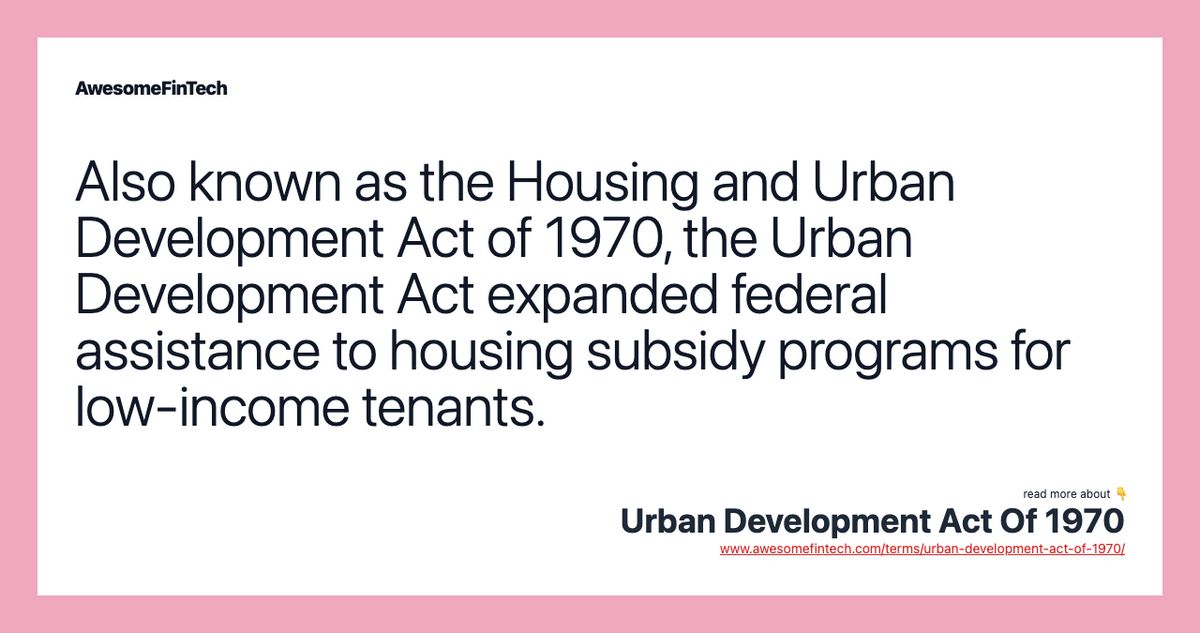Urban Development Act of 1970 What It is History

Contents
Urban Development Act of 1970: What It is, History
What Is the Urban Development Act of 1970?
The Urban Development Act of 1970 is legislation enforced through the U.S. Department of Housing and Urban Development (HUD) that introduced the Federal Experimental Housing Allowance Program and Community Development Corporation.
This act was passed to:
- Establish a national growth policy in the U.S.
- Encourage and support sensible growth and development in states, metropolitan regions, counties, cities, and towns highlighting new community and inner-city growth
- Amend certain laws regarding housing and urban development
Key Takeaways
- Also known as the Housing and Urban Development Act of 1970, the Urban Development Act expanded federal assistance to housing subsidy programs for low-income tenants.
- The act created the Community Development Corporation, a non-profit focused on revitalizing poor communities through direct investment and business development.
- It also ran the Federal Experimental Housing Allowance Program, finding that housing subsidies may not have the positive effect initially thought.
Understanding Urban Development Act of 1970
The U.S. Department of Housing and Urban Development was established in 1937 through the U.S. Housing Act of 1937. The Department of Housing and Urban Development Act of 1965 established HUD as a Cabinet-level agency within the U.S. government. The Urban Development Act of 1970 authorized the government to provide greater outlays for housing subsidy programs and rent supplement programs for low and moderate-income households.
Funding for projects related to the act comes from various sources including state, local, and federal government, donations from individuals and corporations, as well as loans through traditional and non-traditional financial institutions.
The act created the Community Development Corporation, a national network of nonprofit, community-based organizations focused on revitalizing their local communities, typically low-income, under-served neighborhoods that have deteriorated and where investment is scant. These organizations help develop affordable housing and are involved in economic development, sanitation, street beautification, and neighborhood planning projects.
The Federal Experimental Housing Allowance Program
The Act also ran the Federal Experimental Housing Allowance Program, which began in 1973 and ended in 1979, involving over 25,000 families in 12 metropolitan areas with around $170 million in subsidies to individual families. The idea was to see how best to improve housing conditions for low-income people by giving them vouchers to pay for market-rate housing instead of building new public housing.
The Urban Institute concluded in the late 1970s that housing allowances “do not provide significant momentum towards most of the stated goals of HUD policy." Later policies had HUD providing subsidies directly to landlords through the Section 8 program and building additional large public housing projects, which has largely ended.
Federal spending on housing primarily benefits wealthier people. A 2017 study by Apartment List found that the popular tax break called the mortgage interest deduction (MID) cost the federal government $71 billion in 2015, more than double the $29 billion spent on Section 8 funding for low-income renters. In addition, over half of high-income households claim MID, while just 11% of low-income households receive housing subsidies.
Mortgage lending discrimination is illegal. To report discrimination based on race, religion, sex, marital status, use of public assistance, national origin, disability, or age, you can file a report with the Consumer Financial Protection Bureau or the U.S. Department of Housing and Urban Development (HUD).



